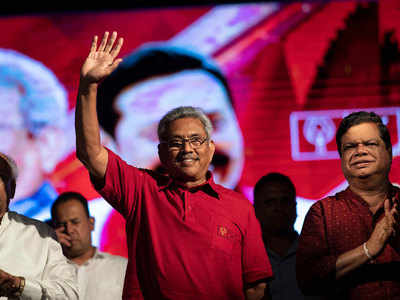- News
- India News
- Why India is keeping a close watch on Sri Lanka elections
Trending
This story is from November 16, 2019
Why India is keeping a close watch on Sri Lanka elections

Sri Lanka Podujana Peramuna (SLPP) party presidential candidate Gotabaya Rajapaksa
Key Highlights
- India is keeping a close watch on the results as the outcome will have a bearing on the country's presence in the Indian Ocean region
- India wants to avoid heeding space in the Indian Ocean to China, which has an increasing number of ships in the waters
- With Mahinda's brother Gotabaya in the fray this time, the country may take a pro-China turn if the Rajapakas return to power
COLOMBO: Sri Lankans voted on Saturday to choose a successor to President Maithripala Sirisena in an election that will decide the future of the country that struggles with security challenges after the Easter Sunday bombings and increasing political polarisation.
The main contenders for the top post include former wartime defence secretary 70-year-old Gotabaya Rajapaksa and the ruling party candidate 52-year-old Sajith Premadasa.
Observers feel the elections could mark a comeback for the Rajapaksa clan, loved for crushing the Tamil Tigers but loathed for alleged war crimes, corruption and cosying up to China.
According to observers, with pro-China Rajapaksa in the fray, India is keeping a close watch on the results as the outcome will have a bearing on the country's presence in the Indian Ocean region where Beijing is increasingly making inroads.
India wants to avoid heeding space in the Indian Ocean to China, which has an increasing number of ships in the waters. The US and France too have an interest in Indian Ocean and have military bases in the region. These common interests are the basis of the new Indo-Pacific strategy that the US is pushing for.
Beijing has loaned and granted Sri Lanka billions of dollars for infrastructure projects under China's immense Belt and Road Initiative spanning Asia and beyond. Former president Mahinda Rajapaksa said credit was unavailable elsewhere.
In July, China gifted a warship to Sri Lanka, in a growing sign of its deepening military cooperation with the strategically located island nation in the Indian Ocean.
What also concerns Western countries, as well as India, is how Sri Lanka had moved closer to China under Mahinda Rajapaksa, even allowing two Chinese submarines to dock in Colombo in 2014.
With Mahinda's brother Gotabaya in the fray this time, the country is expected to again take a pro-China turn if the Rajapakas return to power.
"Chinese entities were also credibly accused of fuelling corruption, illegally funnelling money to favoured political candidates, and inserting sovereignty-violating provisions into their infrastructure agreements," said Jeff Smith, a research fellow at US think-tank the Heritage Foundation.
The main contenders for the top post include former wartime defence secretary 70-year-old Gotabaya Rajapaksa and the ruling party candidate 52-year-old Sajith Premadasa.
Observers feel the elections could mark a comeback for the Rajapaksa clan, loved for crushing the Tamil Tigers but loathed for alleged war crimes, corruption and cosying up to China.
According to observers, with pro-China Rajapaksa in the fray, India is keeping a close watch on the results as the outcome will have a bearing on the country's presence in the Indian Ocean region where Beijing is increasingly making inroads.
China, which has acquired Sri Lanka's Hambantota port in 2017 as a debt swap, has been ramping up its ties with the island nation and expanded its naval presence in the Indian Ocean with an established logistics base in Djibouti.
India wants to avoid heeding space in the Indian Ocean to China, which has an increasing number of ships in the waters. The US and France too have an interest in Indian Ocean and have military bases in the region. These common interests are the basis of the new Indo-Pacific strategy that the US is pushing for.
Beijing has loaned and granted Sri Lanka billions of dollars for infrastructure projects under China's immense Belt and Road Initiative spanning Asia and beyond. Former president Mahinda Rajapaksa said credit was unavailable elsewhere.
In July, China gifted a warship to Sri Lanka, in a growing sign of its deepening military cooperation with the strategically located island nation in the Indian Ocean.
What also concerns Western countries, as well as India, is how Sri Lanka had moved closer to China under Mahinda Rajapaksa, even allowing two Chinese submarines to dock in Colombo in 2014.
With Mahinda's brother Gotabaya in the fray this time, the country is expected to again take a pro-China turn if the Rajapakas return to power.
"Chinese entities were also credibly accused of fuelling corruption, illegally funnelling money to favoured political candidates, and inserting sovereignty-violating provisions into their infrastructure agreements," said Jeff Smith, a research fellow at US think-tank the Heritage Foundation.
End of Article
FOLLOW US ON SOCIAL MEDIA










